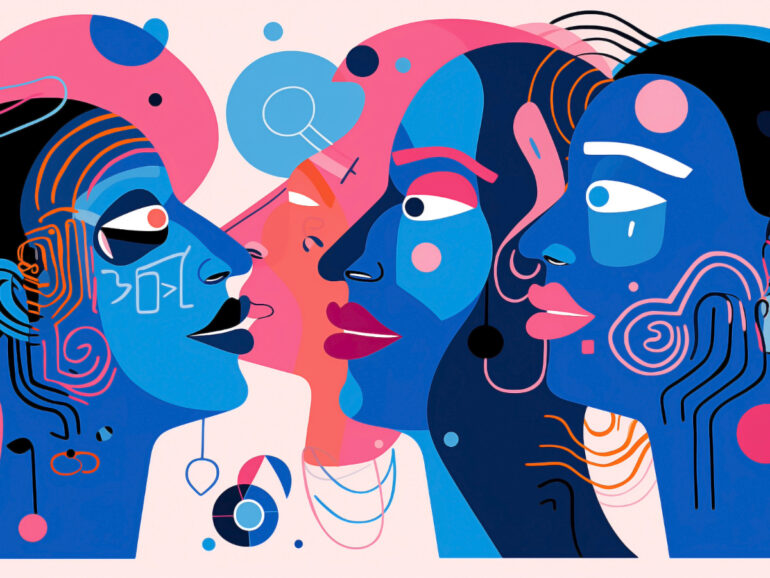Zphyna Caldwell’s 18-year-old daughter Elena always has had a flair for storytelling through animation.
So when Caldwell set out to find for her autistic child an alternative school program that would serve her unique interests, she jumped at the opportunity to with Autistry Studios, a therapeutic educational organization in San Rafael.
Autistry enrolled Elena in a semester-long course that follows the Pixar Animation Studios method of storytelling, and connected her with professional animator Ken Pontac, who served as her mentor. Pontac worked one-on-one with her to improve her skills, and helped Elena create an eight-minute short film about a girl named Hazel.
“It was an incredible film and a great experience for her to make it,” said Caldwell. “She listened to someone else’s ideas, and she incorporated them into a project that was entirely her own. For her, it’s been like going to college.”
The Caldwell family’s experiences were extraordinary but not exceptional. Over the years, Marin County has developed an extensive support system to help neurodiverse families — that is, families that include an individual who is autistic, has attention deficit/hyperactivity disorder (ADHD) or is neurodivergent in some other way. The audience for these sorts of initiatives certainly is growing; according to recent statistics from the U.S. Centers for Disease Control and Prevention, one in 36 children is diagnosed with autism, and one in nine children is diagnosed with ADHD. At last check this local support system comprised more than a dozen organizations and consulting endeavors.
Many of these organizations exist outside public school districts and the Golden Gate Regional Center, which serves as a liaison between eligible families and state and federal funding for support. Often these larger institutions can be bureaucratic and challenging to work with; many of the smaller organizations alleviate that stress. In short, Marin County is a good place to be part of the neurodivergent community.
Autism to the masses
Autistry, the program where Caldwell’s daughter felt at home, is without question the most high-profile of the bunch. The endeavor is run out of a storefront on Fourth Street in downtown San Rafael. This brick-and-mortar location comprises a maker space for in-person art workshops, a small shop that sells what members make and a coffee bar to give autistic teenagers and young adults real-world experience working jobs.
Autistry also is expected to open a Double Rainbow ice cream shop by the end of 2024. But, really, Autistry is about education. Founder Janet Lawson said the outfit’s mission is to build independent adults. She added that Autistry staff help autistic and neurodivergent teens and adults become successfully independent by leveraging their interests and talents while creating a robust, supportive and productive community. The programs serve mostly young adults who have completed high school, though it does take kids as young as 13. As of press time, there were about 40 people enrolled. “We give these kids a safe and encouraging environment in which they can follow their passions, be themselves and figure out what’s really getting in their way,” said Lawson, who is a local marriage and family therapist. “Being neurodivergent isn’t about intelligence or intellectual ability, it’s about processing and perspective and sensory input.”
Lawson founded Autistry in 2008 after she couldn’t find worthwhile programs for her own son, who is autistic. He was 13 then, and he’s 29 now. Over the years, Autistry’s offerings have evolved, too. Today, there are four: therapeutic maker space workshops that meet once a week, a comprehensive adult program that meets five days a week, a skills adaptation program that starts at two days each week and a program that provides transition to adulthood support.
Autistry also offers theater and animation programs, as well as reading, writing and math remedial classes. Through a partnership with the Marin Shakespeare Company, the Autistry Drama Group presented Dorothy’s Adventures in Oz earlier this year. All programs provide college support, vocational training and workplace and social space skill building. They’re all designed to help young people achieve independence. “Many autistic students haven’t had the identity-building experiences that one usually has in high school,” Lawson said. “Being part of a sports team or a drama team — anything that has to do with being with other students and testing your personality against theirs. That’s how you build.”
Without question, one of the most exciting aspects of the Autistry curriculum is the maker space, where young people can learn how to use woodworking tools and create beautiful trinkets. On any given weekday, visitors might see Autistry members working in the back. Many of the items they create, such as hand-turned wood pens and handcrafted wooden pride keychains, are for sale to the public in a modest store out front. Some of the vocational training happens on site, too. Autistry members currently work the coffee shop and will work the ice cream store when that opens, too. Lawson said most young people participate in Autistry programs for three years. Some move on to junior college or college; others get jobs in the community. Many remain involved with Autistry as mentors.
“We haven’t only built a spot to teach and train people; we’ve built a community,” she said.
Advocacy and outreach
Many of the other Marin County programs designed to help neurodiverse families focus on assistance and advocacy. One of the oldest programs in the county is Lifehouse. Founded in 1954, this organization provides services to adults with a range of disabilities. Each client has an individualized support plan, which is like an individualized education plan, only for adults. The organization employs more than 350 service providers who serve clients in both Marin and Sonoma counties. According to Jennifer Hudson, marketing and development manager, the organization enables clients to feel seen.
“We provide hope and a sense of security — a way to know that these individuals will be cared for, no matter what,” she said. “Our goal is to make [our clients] feel like they can be a productive part of society, that they have an important place in all of our communities for the rest of their lives.”
Another program is Undivided, a membership-based organization that pairs parents of neurodiverse families with individual advocates to make their way through the overwhelming systems and institutions that characterize our nation. These advocates, dubbed “Navigators” often are former special needs parents themselves, which means they lead by example and personal experience. Navigators can help with as much or as little as the customer requests.
While Undivided is based in Los Angeles, CEO Seth Besse lives in Mill Valley, and cultivates a healthy customer base in the counties around the Bay Area. He said Undivided works to answer three questions for parents: 1) What should I be doing for my child? 2) How do I do it? 3) Who can help me along the way?
“We partner with parents and build out a roadmap for what they can accomplish to help their child,” he said. Besse added that the goal is to centralize the knowledge that every parent accumulates on their own. “Every parent spends weeks and months and years becoming an expert on how to navigate the system, then their child grows up, and the parents move on. The truth is that it’s far too much for one parent to figure out on their own.”
Other Marin County neurodiverse family support groups are smaller and more grassroots.
The Marin Center for Independent Living, for instance, provides a wide variety of services to promote the independence of people with all types of disabilities and all ages. This includes a youth advocacy group, housing assistance, peer counseling and benefits planning.
The Matrix Parent Network and Resource Center in San Rafael helps families learn how to obtain services and education for their child through collaborative work, trainings and activities. Dedication to Special Education Parent Connections is a San Rafael-based online community for families, educators and professionals. The group meets regularly for monthly playtime sessions on Saturdays at Marindale’s accessible playground. Then, of course, there are those members of the support community who provide help with assessment and individualized education plans.
Think of these entities as hired guns available to help families on a case-by-case basis. Novato-based Arnold Advocacy, for instance, provides support and advice for families with children with special needs to more effectively navigate the educational system. EmpowerEd Psychological Services in San Rafael provides assessment, counseling and consultation services for children and adolescents, as well as assessments for adults who are experiencing challenges in their vocational settings.
Building community
No look at special needs support organizations across Marin County would be complete without spotlighting some of the groups for and by members of the neurodivergent community themselves. Specifically, these organizations help build community among neurodivergent individuals and the people who love them.
One, Common Ground Society, is based in Santa Rosa and aims to serve individuals with disabilities and special needs of all kinds, from all over the North Bay. The group hosts a speaker series, educational programs and meet-ups for special needs families year-round.
Another, the Bay Area Autism Collective (BAAC), is based in San Francisco and serves autistic adults all over the Bay Area, including Marin. Founder and executive director Bird Sellergren started the collective in June 2023 when they realized there weren’t many organizations specifically serving that target demographic. Today, the group serves about 150 people each month. BAAC runs a weekly online support group by and for adults and young adults with autism. The group meets every Sunday, and each session draws an average of 25 to 30 participants from all over the Bay Area. Participation is free, but registration is required.
On any given Sunday, participants might talk about managing feelings of social isolation, finding services, navigating relationship drama or the challenges of advocating for accommodations at work. BAAC runs other groups for autistic adults battling substance abuse problems, transgender adults with autism and autistic individuals who happen to also be parents. Members said they view these sessions as safe spaces to be their true selves — a rarity in a world where autistic individuals often feel the need to “mask” to fit in.
Sellergren added that the groups help combat depression; a peer-reviewed meta- analysis from 2019 indicated autistic adults are four times more likely than allistic adults to experience depression. “While I do have non-autistic relationships that are wonderful, I have found I feel safer with autistic people and it’s much less stressful in the sense that I don’t have to spend as much time wondering what the subtext is about and what they mean and what they want,” Sellergren said. “Without community, the future for us looks different.”


